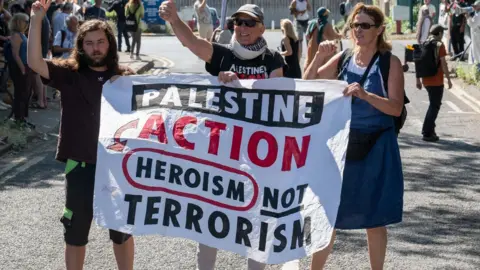 Getty Images
Getty ImagesPalestine Action has won permission to challenge its controversial ban by the UK government under terrorism legislation.
In a major decision, the High Court ruled that the proscription of the group, that has carried out break-ins at defence firms linked to Israel as part of direct action protests, should be reviewed.
Home Secretary Yvette Cooper banned the organisation last month after followers caused an estimated £7m of damage to jets at RAF Brize Norton.
Lawyers for the group’s co-founder Huda Ammori have argued that the ban breaches the right free speech and has acted like a gag on legitimate protest. The government says its ban is justified because it narrowly targets a group that was organising serious criminality
But in his ruling, Mr Justice Chamberlain said that the ban might conflict with rights to free speech and the Home Secretary could have consulted Palestine Action before going ahead.
The ban means that membership or support for Palestine Action is a crime under terrorism legislation that can lead to up to 14 years in jail.
Court documents, disclosed to the BBC, reveal how officials and ministers deliberated for at least eight months over whether to ban Palestine Action under terrorism legislation.
The UK’s terrorism laws focus on banning groups that use serious violence to further a cause. But the definition also allows ministers to outlaw organisations that cause serious criminal damage. Palestine Action is the first group to be proscribed under that part of the definition.
Since the group’s launch in July 2020, Palestine Action Group (PAG) has carried out more than 385 direct actions against firms it links to Israel’s military, leading to more than 676 arrests.
Since last month’s ban, police have made at least 200 more arrests of people suspected of taking part in protests in support of the group.
The cross-government debate over a ban began in earnest last November after an assessment of the damage that PAG members had been accused of causing during a break-in at Elbit Systems, an Israeli defence firm, in Bristol the previous August.
Eighteen people have been charged in relation to that incident, which includes allegations of assaults on a security guard and two police officers.
The individuals have all denied wrongdoing and trials start later this year.
Government papers in the legal challenge, brought by Huda Ammori, Palestine Action’s co-founder, reveal police chiefs told the Home Office the network’s activity was “unaffected” by ordinary criminal investigations.
“Operationally, existing legislation is seen as insufficient to address high-level offences, which meet the definition of terrorism,” officials wrote in March.
“There is currently no existing legislation to deal with [PAG] holistically, meaning the network can only be dealt with on a case-by-case basis in response to isolated incidents of direct action.
“From the perspective of regional police forces, it is argued that this fractured case-by-case approach has proven operationally ineffective, considerably limiting preventative and disruptive opportunities.”
The police argued banning PAG would help prevent crime – but they also warned that it could look like “state repression” and the use of “draconian counter-terrorism legislation”.
That fear was partly echoed by the Foreign Commonwealth and Development Office (FCDO) in the advice it sent to Home Office counterparts.
Officials there said a ban would be read by some international partners as a stand against antisemitism, but added: “Acting in this way may be interpreted as an overreaction by the UK.
“Palestine Action’s activity is largely viewed by international partners as activism and not extremism or terrorism.”
They advised that Palestinians themselves and Arab states could regard banning PAG as an attempt to shut down activism – and a Home Office analysis of potential tensions in the UK also highlighted risks.
“Proscribing PA would almost certainly be perceived as evidence of bias against the British Muslim community in favour of British Jews and Israel more broadly,” wrote officials in one of the documents disclosed in the case.
“[Proscripton] is likely to generate significant discontent and could introduce new social cohesion challenges.”
By the end of March, papers show that Home Secretary Yvette Cooper was considering banning the group – but had raised a series of questions.
The papers indicate she consulted other ministers during May – and finally decided to ban the group after the 20 June break-in to RAF Brize Norton.




